Ministry Trips
My teaching is scheduled during the middle of each week so that I have long weekends for ministry/teaching trips to cities where I have established relationships during the past 16 years.
The first one was in mid-February. I went to Izhevsk near Siberia, my adopted Russian town since 1995. Four days were filled with fellowship, church services, dinners in my honor and much tea drinking and food.
Church members wept on my shoulder, hovering around me with hugs and Russian kisses. These expressions of love come from the closeness developed during seven years there, living like they live, helping them be established in Christianity and teaching the Bible. I am now introduced as the spiritual mother of the people, a title I feel humbled to hear.
Story of Perseverance
Recently I was included with staff members as guests at the Seventh Day Adventist seminary compound, over an hour's drive from Moscow. Theirs is a beautiful story of perseverance. Twenty years ago when legislation for freedom of religion was passed in Russia, all denominations came to establish a Bible school and/or churches in Moscow. Property costs were very high. Seventh Day Adventist finally began to look in regions farther away.
In a small village (with the ever present Russia electric train running through the middle), development was concentrated on one side of the railroad tracks. The other side consisted of an old school built by the Germans many decades prior that had been gutted by fire. Village leaders gave it to Seventh Day Adventist for restoration, along with property surrounding it.
Using donated labor from around the world, over 1,600 Seventh Day Adventist members came during the first year alone. When villagers saw their standard of life and commitment, another 25 acres on the other side of the tracks was purchased for very little. Now, the compound has an administration building, school rooms, dorms, a publishing house, three-story library, gymnasium, cafeteria, other buildings and 90 staff with 300 enrolled in the Christian school and seminary.
Getting the Job Done
Without industry of any kind, the snow on the ground was pure and brilliantly white in that rare winter day of sunshine. I remembered the scripture in Isaiah, "Though your sins be as scarlet they shall be white as snow".
I sorely needed the use of a washer and dryer. I had washed small items in the sink from time to time but the bigger items could wait no longer. The old saying, “Necessity is the mother of invention" can be literally translated, “Pressing need is the mother of creativity.” I put the big items on the floor of the shower, soaked them with water, added soap, got on my hands and knees and started kneading them like dough. When my knees could no longer hold out, I took off my shoes, stood on the clothes and began a ritual than could only be described as stomping grapes. It got the job done!
St. Petersburg
There was flu or virus that some of the students had here at the seminary. Without much attention to spreading germs, I felt as if I was coming down with it too just as I was preparing to go to St. Petersburg the first week of March.
I traveled on the five-hour express train alone and a delegation met me at the station. St. Petersburg is 400 miles due north of Moscow, and there is a prevailing strong wet and cold wind blowing from off the Bay of Finland that hit me in the face as I disembarked.
The host pastor, Valery, was quite perturbed that the owner of the flat used as the office/guest quarters did not first check with him in advance and went forward with a project to paint the interior doors. To help eradicate the strong paint odor, Valery opened all windows. The outside temperature was below freezing, so you can imagine that inside was not much different with all windows open.
That night, after waking often, shivering, I finally put my fur coat on top of the two thin blankets, and repeated it all four nights.
I managed to get through the four teaching sessions of the seminar and Saturday went well during prayer ministry with members and pastors from five churches in the region. Sunday we had a regular church service.
Missionary Cravings
Russian food is nutritious here at the school but the budget does not allow for a lot of creativity and the menu is repetitious. It is normal for me to start thinking often of American food after I have been in another country over a month. Funny thing is that I crave things that I rarely order in the U.S. because of awareness of eating healthy. But at the moment a big fat hamburger with everything on it and a chocolate milkshake with real ice cream would taste mighty good.
The Need to “Own”
The current situation for all denominations in Russia has been hard on the growth of Christianity. The Russian Orthodox Church has much clout in the government and has always objected to evangelical growth. They pressured the government to issue an ordinance preventing any public building to be rented to a religious organization.
Of course this did not affect those with their own building, but those are few, and churches with sizable congregations that formerly rented a large cultural hall or theater were forced into small places rented by private individuals. Attendance has declined greatly everywhere.
The seminary building is presently being used by three different congregations.



